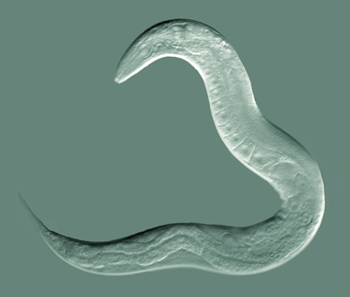Ilka was one among the 15 students selected as IGSP (Institute of Genome Sciences & Policy) summer fellows. An Evolutionary Anthropology major and a Dance minor, her project involved starving 1 mm worms and seeing what happened over a ten week period.
Her research project was "The role of TGF-beta and insulin pathways in C. elegans L1 arrest and recovery." Her mentor was Dr. Ryan Baugh, Assistant Professor, Department of Biology.

We wanted to explore the worms' response to starvation, and control the nutritional factors within the worms to see which genes were involved in the process," explains Ilka. "We wanted to identify which pathways are involved in starvation induced arrest, and to what extent."
Nematodes go into two reversible stages like hibernation if they are starved. If you starve them at an L1 larvae stage, they stop growing and can survive just like that, with an increased resistance to stress.
But the amazing thing is that once you give them food again, they will start again from where they stopped, as if a machine was restarted. "Worms can survive by eating a hard cuticle for almost four months."
"We knew that 2 pathways are involved in starvation induced arrest- the Insulin pathway and the TGF-beta (Transforming Growth Factor-beta) pathway. The main purpose was to understand to what extent the TGF-beta pathway was involved."
"I had seven different strains of worms, where one was the wild type while six had mutations. I starved each worm and analyzed how long they could survive over time. Through a variety of experiments and Micro X-ray experiments we found the TGF-beta pathway is involved."
The interesting part is that this kind of arrest creates hope for age-stagnation in humans too.
"I now understand how research in science is conducted at a professional level. It is a lot about taking big risks, as you never know to what extent your research is going to contribute to science."
She notes that research is a lot of thinking, as one needs to correlate a lot of things and scientifically and experimentally prove every single result.
"This was a wonderful experience for me. It was great interacting with my mentor, professors and other scientists who were doing really cool research. However, from this research experience, I also learned that pottery lessons are not science! And flies are really annoying to work with!"
So what are her future plans? "I am pre-health, and I probably want to pursue physical therapy as a career. Apart from many great things I take back from this summer fellowship, I figured out a simple cardinal rule for scientific research-- there is absolutely no room for mistakes!"


No comments:
Post a Comment